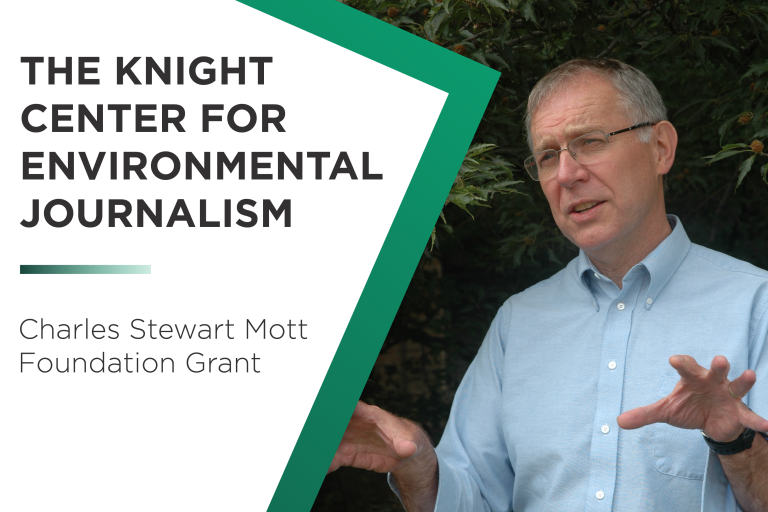A lack of diverse and inclusive staff can hinder the ability of a news organization to explain environmental challenges and solutions. In Michigan, the situation is compounded by the need for more and better Great Lakes and environmental reporting by emerging journalists.
The Knight Center for Environmental Journalism at Michigan State University’s School of Journalism looks to address both concerns through a new partnership with the Charles Stewart Mott Foundation. Underwritten by a $150,000 grant from Mott, the two-year project will build on the assets of the two organizations through the creation of internships, reporting positions and scholarships for tuition and professional conferences.
David Poulson, senior associate director of the Knight Center, said Mott’s support is critical to creating a network of reliable and credible environmental news stories. Those stories, he added, contribute to building an informed public that influences policymakers and can help shift the tide of the effects of climate change in all communities.
Poulson said the mission of MSU’s Knight Center for Environmental Journalism is to help journalists better report on some of the most critical challenges the world faces.
“The demand for skilled and diverse climate reporters is growing,” he said. “That demand should only grow more as the consequences of climate change become more intense and better understood.”
The value of lived experiences
A student or reporter’s lived experiences play an enormous role when covering climate change. When a news organization’s staff lacks diversity, many stories can be overlooked since reporters pursue familiar topics rooted in their interests or background.
“If you grew up middle class and white, you may never realize that your city has problems with air pollution, toxic dump sites, lead poisoning or a lack of fresh food and produce,” he said. “But if you grew up in a marginalized community within the same city, you may be living amid all those problems. Those two potential reporters have a very different environmental experience of living in the same community.”
In a similar way, stories about natural resource conflicts written by a white reporter may center on recreational and economic activities to be gained or lost. But the same stories in the hands of a Native American reporter may explore deeply held spiritual beliefs threatened by those conflicts. Both, Poulson said, are important perspectives on important stories.
In 2018, the Pew Research Center reported that 77 percent of newsroom employees are non-Hispanic whites, compared with 65 percent of people in other industries. The gap is more striking in climate change coverage. A 2020 survey of nearly 500 members of the Society of Environmental Journalists (SEJ)by the Center for Climate Change Communication at George Mason University revealed that 91 percent were white, 4 percent were Hispanic, 3 percent were Asian Indian, and the remaining were Mexican American/Chicano, African American and American Indian/Alaskan Native.
“A white journalist, frustrated with reporting accurately on environmental justice, once told me that a reporter’s expertise is her or his lived experience,” Poulson explained. “I like that line because it makes us realize that a failure of diversity is a failure to achieve the journalist’s goal: To capture the truth as best as we can.”
A base of strength
The Knight Center operates Great Lakes Echo—an environmental news service that provides training for students aspiring to pursue environmental journalism. The Mott Foundation, in turn, supports the Great Lakes News Collaborative—a group of professional organizations that share environmental news stories and reporting.
Poulson said the new partnership will develop a reporter production pipeline for the Mott collaborative and other professional news organizations focused on the environment, especially climate change. Select students who can contribute to diversity of environmental reporting will be offered scholarships for environmental reporting classes and jobs reporting for Great Lakes Echo starting spring semester 2023. Scholarship applications will be underway come spring for the annual SEJ conference, and for summer internships with members of the Great Lakes News Collaborative.
“The Knight Center is uniquely positioned to tap the energy and interests of the generation that will suffer the most from unmitigated climate change,” he said. “It’s the generation with the most at stake. But young students are also from a generation that has the most understanding of what is happening. Our charge is to grow some of these students up to be responsible reporters.”
By: Ann Kammerer
